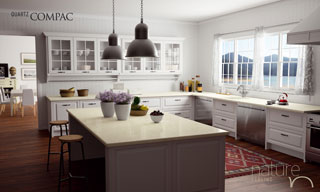
In today's current market, countertops may be designed in just about any material. This can make the task of home renovations that much more daunting. To help alleviate some intimidation, it is useful for homeowners and designers to know the pros and cons of each type of material. This way, the most logical choice can be made to meet design demands, as well as expectations of performance.
Popular material choices pertaining to home renovations can be divided into two simple categories - natural stones, or man-made. Common choices of both categories include:
-
Granite
-
Marble
-
Ceramic tile
-
Soapstone
-
Engineered stone
-
Wood
-
Laminate
-
Solid surface
-
Stainless steel
-
Concrete
Natural stones tend to be preferred over man-made options. Particularly, granite, marble, and ceramic tile seem to get the most interest from homeowners looking to upgrade kitchen countertops.
Granite
Granite is perhaps the most popular natural stone used for countertop design. Not only is it exceptionally attractive and offers a wide range of colours and unique patterns, it also has many advantages over other natural stones. Because of these factors, granite is highly valued and by default, will add value to any space in which it is used.
A downfall of granite is its price. It tends to be one of the more costly natural stones. However, many deem granite's price worthy because of its benefits. There are also alternatives that help save homeowners money, such as granite tiles. Granite tiles perform the exact same way as solid granite, maintaining all of solid granite's benefits. However, because they are tiles and not solid, granite tiles are significantly less expensive.
Some advantages of granite - whether it be solid or tile- include its diverse appearance. Because granite comes in such a great variety of colours and patterns, finishes and edges, it can accommodate almost any sense of style. Other granite benefits include:
-
Its strength granite is known to be as strong as a diamond, and is one of the more denser types of natural stones
-
Its low maintenance requirements -- with the correct sealant, granite needs very little upkeep.
It is important for homeowners to keep in mind the downfalls of granite. If solid granite does not work into renovation budgets, consider granite tiles. Otherwise, homeowners may run out of money half-way through renovations, leaving the home incomplete and inhabitable. It is also important to remember that although granite is stain, burn, and scratch resistant, it is not completely protected from these signs of wear-and tear. About once a year, it is recommended for homeowners to have their granite pieces resealed. This will increase the life-span of any granite surface such as countertops, floors orwall tiling.
Marble
Marble is another type of natural stone that also tends to be a little more costly than other types. For use specific to the kitchen space, unlike granite, marble is not the most appropriate choice. Marble is a porous stone, meaning it is susceptible to staining and scratching, even more so than granite. For use within the kitchen, marble is more ideal as a baking board, as its smooth surface is excellent for working with sticky doughs. Marble is also seen more often in bathrooms or as foyer flooring. Sealing marble pieces aids in their longevity and resistance to displaying signs of use, like scratches or water stains. Similar to granite, marble is a very beautiful stone with unique patterns. It is in high demand, and will increase the elegance of any home.
Ceramic Tile
In comparison to granite and marble, ceramic tile is a much less expensive option for homeowners looking to update their kitchen and countertops. Usually inexpensive products mean some sort of quality or benefit was sacrificed. This is not the case with ceramic tiles. Despite it being a cost effective solution, ceramic tiles still have many benefits which are similar to those of more expensive natural stones. For instance, benefits of ceramic tile include:
-
Durability
-
Minimal maintenance
Additionally, tiles, as opposed to solid pieces, help to accelerate the installation process, meaning renovations can be completed much more quickly. It also means that damages and replacements are less demanding, time consuming, and costly, as only the damaged tiles need to be replaced, rather than the entire, solid piece.
Other benefits of ceramic tile countertops include its availability in an assortment of colours, textures and patterns, and designs. Just because ceramic tile is an inexpensive option, it does not mean it looks inexpensive. With its ranging colour and pattern choices, it offers the same elegance and allure of granite and marble.
One downside of ceramic tiles is grout lines. However, many do not even think of grout lines as a disadvantage! Some homeowners see grout lines as a positive effect, as many view it as part of the style and appearance. For those who are not fond of grout lines, a professional supplier and installer can use their skills to help minimize the unsightly disadvantage of grout lines -- that is staining. Grout lines are prone to staining, but with a knowledgeable installer, an appropriate material can be used to reduce the signs of stains on grout lines.